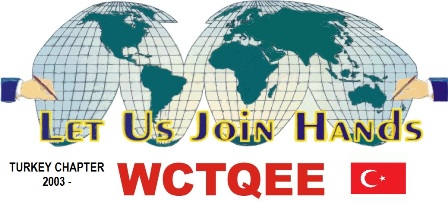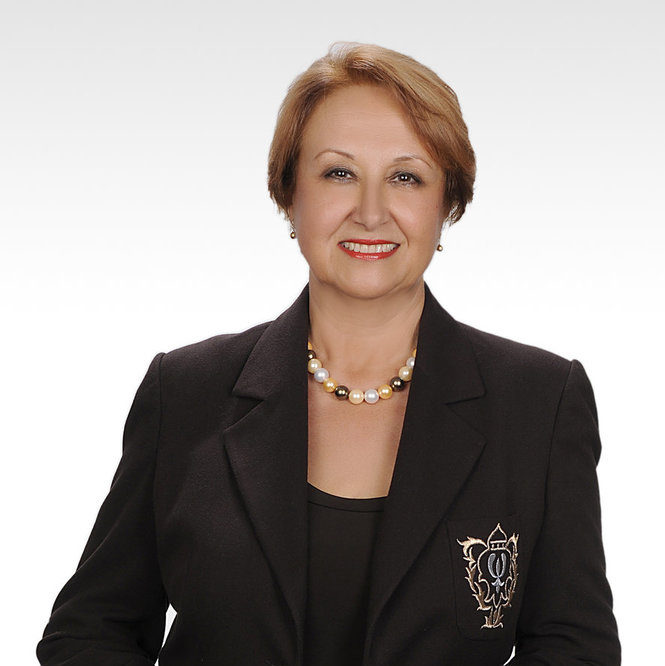WCTQEE-TURKEY CHAPTER
 The Turkey chapter of the World Council for Total Quality & Excellence in Education (WCTQEE) started in 2003 after the approval of Dr Hayal Köksal as the Director General of Turkey within the Council. She attended ICSQCCs in India and she organized the 11th ICSQCC in Yeditepe University, in Istanbul on 28-30 August 2008. The following article was presented by the President Jagdish Gandhi during that Convention:
The Turkey chapter of the World Council for Total Quality & Excellence in Education (WCTQEE) started in 2003 after the approval of Dr Hayal Köksal as the Director General of Turkey within the Council. She attended ICSQCCs in India and she organized the 11th ICSQCC in Yeditepe University, in Istanbul on 28-30 August 2008. The following article was presented by the President Jagdish Gandhi during that Convention:
The History of SQCs and WCTQEE
City Montessori School in Lucknow, India was the first school to introduce the Quality Control Circle concept in education to inculcate quality awareness in students. I first came across the concept of Quality Control Circles in Japan and on return from that country introduced it in our school with the object of catching children at their formative stage for inculcating quality awareness in them.
It happened in 1992 during my first visit to Japan to participate in an educational conference. I was highly impressed by the all-around economic growth and progress made by Japan in every sphere of life, even though the country had been virtually destroyed during the Second World War and had also witnessed the bombardment of Hiroshima and Nagasaki in 1945. I was impressed by the hardworking and meticulous nature of the Japanese people. Half-jokingly, I asked one of the organizers of the conference, “You Japanese have already captured many markets in Europe and America and have become an economic superpower by improving the quality of your products. Why don’t you people take some rest and feel easy now? What drives you to keep working so hard to improve?” The woman replied, “Mr Gandhi, quality and continuous improvement has become a way of life for us Japanese”. She told me about the Kaizen philosophy of continuous improvement propounded by Dr Ishikawa, after the collapse of the Japanese economy during the 2nd World War and devastation of Hiroshima and Nagasaki. Only continuous improvement, as envisaged in Kaizen Philosophy, could improve the quality of goods acceptable to the world market as one of the means of building the Japanese economy. From the success of Kaizen Philosophy, ‘Quality Circles’ came into being to inspire and educate the work force toward quality improvement. Quality Control Circles emphasize continuous improvement in every aspect of life. It was then that I was struck by the idea that the Kaizen concept could also be applied in academics to children in their formative years.
Borrowing the concept of Kaizen Philosophy, which means ‘continuous improvement’, I thought to myself that the quality of the product could be further improved if the person producing the goods possessed essential qualities and abilities. The Japanese industry took a step forward by introducing TQM (Total Quality Management) to achieve higher quality in their goods & products. I pondered, and thought that if a child could be shaped as a total quality person right from his childhood through the techniques of Quality Control Circles, he/she would become a total quality manager. Thus the focus of Students’ Quality Control Circles is primarily on fostering ‘Total Quality Persons” (TQPs) as a pre-requisite to ‘Total Quality Management’ (TQM).
After studying the concept, in Japan I discussed it with our Principals. Dr Vineeta Kamran, Principal of CMS, Kanpur Road Campus, accepted the challenge of introducing it in CMS. She established the world’s first Students’ Quality Control Circle, ‘Jai Jagat,’ with the help of Mr P.C. Bihari, a Q.C. expert in the Indian Railways. Dr Kamran made the CMS Kanpur Road the world’s first center of Students Quality Control Circles movement. A number of Q.C. case studies were prepared and presented by her students in regional, national and international QC conventions all over the world. Thus, CMS Lucknow became the first institution to introduce the concept of Quality Circles in academics.
Students of CMS, Kanpur Road Campus, prepared and presented their case studies in Sri Lanka, Mauritius, Malaysia, Bangladesh, Australia, the U.K., Singapore, Thailand and the USA, which were very well received and highly commended. In all these case studies, the underlying emphasis was on improving the quality of the person. Under Dr Vineeta Kamran’s guidance, five International Conventions of Students’ Quality Control Circles have already been organized. The I & II International Students Quality Control Circles (SQC) were organised by her school in Lucknow and the 3rd convention was held in Mauritius, the 4th again by her branch, and the 5th in the United States of America. Her school has also founded the ‘World Council for Total Quality and Excellence in Education’ with the assistance of renowned Q.C. experts of seven countries. Several more countries have joined this world council.
In the present scenario, the standard and quality of the person has become the first casualty in the race to acquire material possessions. In this blind race, character building and spirituality has been neglected, with the result that humankind no longer cares for the good of others. We have become selfish, ignorant about the real purpose of life on earth, and indifferent to the service of humanity. The purpose of starting Students’ Quality Control Circles is to improve every child – every child being a gift from God to the world, and the pride of all humanity.
There has been a steady decline of human values and the quality of education in schools. Unfortunately, this is a global phenomenon. Present day schools are only providing material education, concentrating only on a prescribed syllabus, and ignoring human and divine education. Progress, good governance, charitable works, trades, arts and handicrafts, sciences, inventions and discoveries are all essential for the growth of human beings, along with spiritual and divine education, which makes an ideal human being. This decay has affected industry too, resulting in sick industries, with their closures rendering large numbers of employees jobless and adversely affecting the global economy.
Therefore, it is an opportune time for industry and educational institutions to become closer, to work in tandem, for the greater good of society. We should concentrate on the quality of man before we emphasize the quality of machines. A healthy industry needs Total Quality Management (TQM), which only schools can provide by producing Total Quality Persons (TQPs).In CMS, we are imparting quality education that caters to the material, human and spiritual requirements of children in order to make them Total Quality Persons (TQPs). We feel that educational institutions all over the world should now strive to make every child a Total Quality Person (TQP) so that he or she may become better and smarter.
The quality movement in education will gain more momentum when industries and business-houses come forward to help schools that are promoting the concept of quality. These commercial agencies should adopt one or more such schools since they are preparing high-quality students for the marketplace. If schools produce high-quality people, industry will have no problem in getting a proper work force, and Total Quality Management (TQM). The Quality Circle Forum of India QCFI helped us in organizing the International Conventions on Students’ Quality Control Circles (ICSQCC) since the year 1998.
Today, the world is at a crossroads. We are all directly responsible, even as passive witnesses, for this pathetic situation. We are not leaving a proud legacy for the future generations. While we can be truly proud of our scientific advancements, we still lack the maturity and courage needed to build a new civilization. We are allowing this world to be ransacked by narrow-minded people who are using our scientific and technological advancements for destructive purposes. Let us all take a pledge to help the children, and to fight this curse courageously. Let us help the younger generation to build a new world, based on unity and peace. Let all the religions unite to bring about world unity and world peace, which will not be difficult when we realize that all manifestations of God have come from one source. Let us make this world a better place to live in. Let this convention help us to march in that direction.
Industries can play a vital and constructive role in creating this new climate of unity, cooperation and growth. In some countries, industries are helping their governments by running public services and maintaining high standards of living for everyone. In our own country, some of our big industrial houses are supporting philanthropic projects in the wider interest of society. I appeal to all the heads of the industry to follow their example.
Please allow me to state that the CMS initiative for the establishment of Students’ Quality Control Circles has been applauded by influential organizations and individuals across the world. In the International Convention of Students’ Quality Control Concepts, held in George Town in USA in 2002, CMS efforts were praised by the organizers for promoting the QC concept. The Mayor of Georgetown, Mr Everrete Varney, honored me by presenting me with the key to the city, on behalf of its citizens’ gratitude for the introduction of quality circles in education.
It was very significant in the history of the Quality Control Circle concept within academia when Dr Hayal Koksal, Educational Quality Consultant and Researcher of Turkey invited Dr Vineeta Kamran, Principal of the City Montessori Degree College, in September 2004, to share the philosophy of Total Quality Management. Her visit to Turkey was eventful, and subsequently opened a new era of exchange. We organized Ataturk Week celebrations in CMS for unity and peace. We also named the big conference hall in CMS as “Ataturk Hall”, and Dr Hayal Koksal was kind enough to grace the event with her presence.
Dr Hayal Koksal, upon returning to her country, has continued to work relentlessly on the concepts of quality and peace. She introduced International Students’ IMECE Circles (QC) at her Turkish Center for schools of Quality, and at the Quality and Peace Education Centre in 2004. In 2008 – upon Dr Köksal’s invitation – Dr Vineeta Kamran, myself, and the QC Team participated in the SQC/KALBEMER Conference in Istanbul, and we were highly impressed by the success of the convention.
May Peace Prevail on Earth.
Dr Jagdish Gandhi
Chairman, WCTQEE
The Advisors and Directors General of the Council are:
Dr Jagdish Gandhi, Chairman, WCTQEE, India
Dr (Mrs.) Vineeta Kamran, Executive Director, WCTQEE, India
Prof Syed Ali, Advisor, WCTQEE, USA
Prof Richard Ennals, Vice Chairman, WCTQEE, UK
Mr. David Hutchins, Director General, UK
Dr Hayal Koksal, Director General, Turkey
Mr. Abdul Wahid Mir, Director General, Pakistan
Mr. Herath Kularathna, Director General, Sri Lanka
Prof. M.R. Kabir, Director General, Bangladesh
Mr. A.M.M. Khairul Bashar, Advisor, WCTQEE, Bangladesh
Mrs. Chandrani Goonatilake, Co-director General, Sri Lanka
Mr. Chris Ford, Co-ordinator, UK
Mr. Madhukar Narrain, Director General, Mauritius
Prof. Dinesh Chapagain, Former Director General, Nepal
Mr. Andre Lim, Executive Director, WCTQEE, Singapore
Dr Geeta Gandhi Kingdom, Advisor, WCTQEE, UK
Acn. Shan Ruprai, Director General, Australia
Mr. David J. Crawford, Director General, WCTQEE, South Africa
Ms. P. Mangalika, Advisor, WCTQEE, Sri Lanka
Ms. Ladyana Zoraya Abdullah, Co-Director General, WCTQEE, Malaysia
Dr. Shanie Ruprai Co-ordinator, WCTQEE, Australia & New Zealand
Mrs. Archana Behari, Head of Training, Corporate Office, CMS, India.
For more information: http://www.cmseducation.org/icsqcc/wctqee.htm
